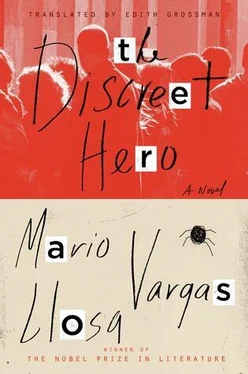“Shall I tell you something?” He looked at them with an expression that was partly distressed, partly defiant. “The truth is I’m not at all comfortable about the conversation we’re about to have.”
“Neither am I, Father,” said Fonchito. “There’s no reason to have it. I know very well that my papa’s nerves are on edge because of me. If you like, you do whatever you have to do and give me a magazine to read, even if it’s a religious one. Then we’ll tell my papa and stepmother that we talked and you can make up something to reassure them. And that’ll be that.”
“Well, well,” said Father O’Donovan. “The fruit doesn’t fall far from the tree, Fonchito. Do you know that at your age, in La Recoleta, your father was a great bamboozler?”
“Did you get to talk to him about that man?” asked Rigoberto, not hiding his anxiety. “Did he open up to you?”
“The truth is, I don’t know,” said Father O’Donovan. “This boy is like quicksilver, he always seemed to be slipping away from me. But don’t worry. I’m sure of one thing at least. He’s not crazy, he’s not delirious, and he’s not kidding you. I thought he was the healthiest, most centered child in the world. The psychologist who saw him told you the absolute truth: He has no mental problems at all, as far as I can judge. Of course, I’m not a psychiatrist or a psychologist—”
“But then this man’s appearances,” Lucrecia interrupted. “Did you find out anything certain? Does Edilberto Torres exist or not?”
“Though it might not be entirely accurate to say he’s normal.” Father O’Donovan corrected himself, avoiding the question. “Because the boy has something exceptional, something that differentiates him from the rest. I’m not referring only to his being intelligent. He’s that, certainly. I’m not exaggerating one bit, Rigoberto, and I’m not saying this just to please you. But besides that, the boy has in his mind, his spirit, something that draws one’s attention. A very special, very personal kind of sensibility we ordinary mortals don’t possess. Literally. As for the rest, I don’t know if this is a reason to be glad or frightened. And I don’t discount the possibility that he wanted to give me that impression and succeeded, as a consummate actor would. I really wasn’t sure whether I should come and tell you this. But I thought it was better if I did.”
“Can we get to the point, Pepín?” Don Rigoberto had become impatient. “Stop beating around the damn bush. I’ll speak frankly: Cut the bullshit, and let’s get to the meat of the problem. Speak clearly and please stop trying to save your own ass.”
“What awful language, Rigoberto,” said Lucrecia in reproof. “It’s just that we’re so terribly worried, Pepín. Forgive him. I think this is the first time I’ve heard your friend Ears swearing like a truck driver.”
“All right, I’m sorry, Pepín, but tell me once and for all, old man,” Rigoberto insisted. “Does the ubiquitous Edilberto Torres exist? Does he appear to him in movie theaters, in discotheque bathrooms, on school bleachers? Can all this nonsense be true?”
Father O’Donovan had begun to perspire again, copiously, and now it was not due to the bicycle, thought Rigoberto, but the stress of having to render a verdict on this subject. What in hell was it? What was going on?
“Let’s put it this way, Rigoberto,” said the priest, handling his words with extreme caution, as if they had thorns. “Fonchito believes he sees and talks to him. I think that’s incontrovertible. Well, I believe he believes it absolutely, so that he believes he isn’t lying to you when he says he’s seen and talked to him. Even though these appearances and disappearances seem, and are, absurd. Do you understand what I’m trying to say to you?”
Rigoberto and Lucrecia looked at each other and then at Father O’Donovan in silence. The priest now seemed as confused as they were. He’d become sad and clearly wasn’t happy with his answer either. But it was evident he had no other and couldn’t give a better explanation. He didn’t know how.
“I understand, of course I do, but what you’re telling me doesn’t mean anything, Pepín,” Rigoberto complained. “That Fonchito isn’t trying to deceive us was one of the hypotheses, naturally. That he might be deceiving himself through autosuggestion: Is that what you believe?”
“I know that what I’m telling you is a disappointment, that you were both hoping for something more definitive, more categorical,” Father O’Donovan continued. “I’m sorry, but I can’t be more concrete, Ears. I can’t. This is all I could make of it. That the boy isn’t lying. He believes he sees the man and perhaps … perhaps it’s possible he does. That he’s the only one who sees him and nobody else does is something I can’t get past. It’s simple conjecture. I repeat: I don’t exclude the possibility that your son is stringing me along. In other words, that he’s more astute and skilled than I am. Maybe he takes after you, Ears. Do you remember at La Recoleta when Father Lagnier called you a mythomaniac?”
“But, then, what you’ve learned is not at all clear but very obscure, Pepín,” Rigoberto murmured.
“Is it a question of visions? Or hallucinations?” Lucrecia attempted to make things more explicit.
“You can call it that, but not if you associate those words with mental unbalance or disease,” the priest declared. “My impression is that Fonchito has total control of his mind and emotions. He’s a well-balanced boy and distinguishes clearly between the real and the imaginary. I can definitely assure you of that, I’d bet my life on his sanity. In other words, this isn’t something that can be resolved by a psychiatrist.”
“I assume you’re not talking about miracles,” said Rigoberto, irritated and mocking. “Because if Fonchito is the only person who sees Edilberto Torres and speaks to him, you’re talking about miraculous powers. Have we fallen so low, Pepín?”
“Of course I’m not talking about miracles, Ears, and neither is Fonchito,” said the priest, now irritated as well. “I’m simply talking about something I don’t know what to call. The child is having a very special experience. I won’t say a religious experience because you don’t know and don’t want to know what that is, but let’s compromise and use the word ‘spiritual.’ Something to do with sensitivity, with extreme emotion. Something that only very indirectly has to do with the material, rational world we move through. For him, Edilberto Torres symbolizes all human suffering. I know you don’t understand me. That’s why I was so afraid to come and tell you about my talk with Fonchito.”
“A spiritual experience?” Doña Lucrecia repeated. “What does that mean exactly? Can you explain, Pepín?”
“It means that the devil appears to him, that his name is Edilberto Torres, and that as it turns out, he’s Peruvian,” summarized a sarcastic and angry Rigoberto. “Basically that’s what you’re telling us, Pepín, in the inane prattle of a miracle-faking priest.”
“Lunch is served,” said Justiniana, just in time, from the doorway. “You can come to the table whenever you like.”
“At first it didn’t bother me, it only surprised me,” said Fonchito. “But now it does. Though ‘bother’ isn’t the right word, Father. It disturbs me, rather, makes me feel bad, makes me sad. Ever since I saw him cry, you know? The first few times he didn’t cry, he only wanted to talk. And though he doesn’t tell me why he’s crying, I think he’s crying for all the bad things that happen. And for me, too. That’s what hurts me the most.”
There was a long silence, and finally Father O’Donovan said the prawns were delicious and he could tell they came from the Majes River. Should he congratulate Lucrecia or Justiniana for this delicacy?
Читать дальше

![Гарри Гаррисон - Bill, the Galactic Hero [= The Starsloggers]](/books/87536/garri-garrison-bill-the-galactic-hero-the-star-thumb.webp)










